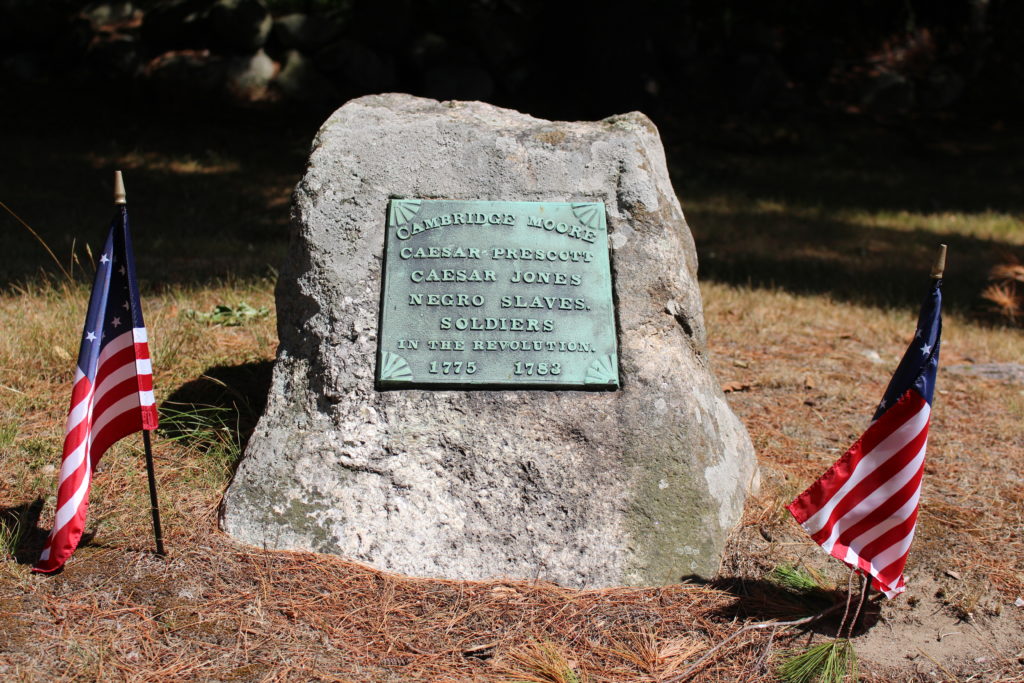“Few are the memorials that tell the rising generation that such people ever lived.”
— Boston Globe, April 19, 1896
Located in Bedford’s Old Burying Ground, the African Reservation Monument recognizes three enslaved men who fought for the country’s independence from Britain: Cambridge Moore, Caesar Prescott, and Caesar Jones. Erected in 1896, it may be one of the country’s earliest monuments recognizing African Americans by name for their service in the American Revolutionary War.
As recorded by Abram English Brown, Secretary of the Bedford Historical Society in the report of the Society to the Trustees of the Free Bedford Public Library Corporation within the Annual Report of the Officers for the Town of Bedford for the Financial Year Ending in 1897, “the graves of three of the African race, who fought to the credit of Bedford in the Revolution, have been marked by setting up a boulder in the African reservation of Burying Ground, on which is seen a bronze plate suitably inscribed. The dedication of this memorial was an impressive feature of the public service of April 19th.”
The monument was dedicated to honor the three men on the same day as the Sons of the American Revolution marked the graves of the forty-four soldiers from Bedford who fought in the American Revolution.
The monument became known as the African Reservation Monument reflecting its location marking the portion of the burying ground where Bedford’s African Americans are buried in unmarked graves.
A bronze plaque affixed to a granite boulder reads:
CAMBRIDGE MOORE
CAESAR PRESCOTT
CAESAR JONES
NEGRO SLAVES.
SOLDIERS
IN THE REVOLUTION.
1775 1783
Unveiled on the third anniversary of Patriots’ Day, the African Reservation Monument was featured in the Boston Globe article “To Honor Slave Patriots” published on that day. Noting that Moore, Prescott, and Jones earned their freedom by serving in the Revolution, the article proclaimed that “today Bedford takes a step toward paying a debt of gratitude to the memory” of the soldiers, and “that the deeds of this race have been but sparsely told and few are the memorials that tell the rising generation that such people ever lived.” The article also notes the service of Lexington’s Prince Estabrook and Framingham’s Peter Salem.
As well-intentioned as this monument may be, it also reveals the bitter irony that Black Patriots who endured slavery were fighting for liberties that were not necessarily guaranteed to them. Some popular and academic histories assume that manumission—that is, freedom from bondage—was given to all servants and enslaved people who fought, but no such formal standard existed. In fact, the Continental Army was demonstrably reluctant to accept enslaved men into its ranks. General George Washington formally mandated in 1777 that only freemen could serve, though this instruction was not always followed. For some Massachusetts towns, promising emancipation was the only way to fill recruitment quotas without blatantly violating the Continental Army’s prohibitions on recruiting enslaved persons.[1]
Such may have been the case for Moore, Prescott, and Jones. The men initially served (willingly or not) so that the town could meet its conscription quotas. Their subsequent tours in the Continental Army are believed to have been served as freemen where they received a paid bounty, though there is some evidence to suggest this may not be accurate. In Cambridge Moore’s case, for instance, the December 1780 resolve that recruited him for three additional years still referred to Moore as an African American “servant” belonging to Captain John Moore. The same John Moore was one of the selectmen responsible for finding men to fill Bedford’s conscription quotas.[2]
_________
[1] John Hannigan, “Enslavement and Enlistment,” National Park Service, 2014, https://www.nps.gov/articles/000/john-hannigan-patriots-of-color-paper-3.htm; Joyce Lee Malcolm, “Slavery in Massachusetts and the American Revolution,” Journal of The Historical Society 10, no. 4 (December 2010): 432–435.
[2] Abraham English Brown, History of the Town of Bedford, Middlesex County, Massachusetts: From Its Earliest Settlement to the Year of Our Lord 1891 (Bedford, MA: self-pub., 1891), 31–32.


